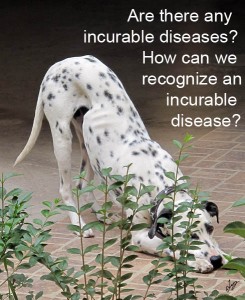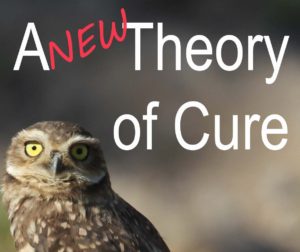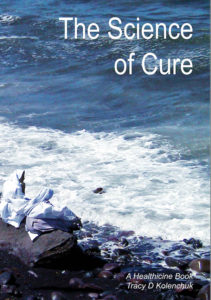 What is an incurable disease? How can we know for certain that a disease is curable or incurable?
What is an incurable disease? How can we know for certain that a disease is curable or incurable?
There are lots of diseases that are classed as ‘incurable’ by modern medicine. It’s easy to make a list. Start with all of the ‘chronic’ illnesses. By definition, chronic illnesses are ‘chronic’, and patients are advised to ‘learn to live with them’. Arthritis, asthma, hypertension, diabetes, Parkinson’s disease, even cancers… there are many more.
Are they really incurable? Wikipedia’s editors removed their page about ‘incurable diseases’. Why? According to Wiki, ‘this is a list with no clear-cut criteria for inclusion‘, and ‘the lack of any sourcing to indicate that the majority of these are indeed considered “incurable”‘. One editor commented ‘Absolutely pointless grab-bag of medical conditions. No attempt at referencing. Unlikely to ever become useful.‘ Wiki has brought back the page for incurable diseases – but it’s still nonsense.
Why can’t Wiki’s experts create a list of ‘incurable diseases’? Because incurable, curable, and even cure are poorly defined, not just in dictionaries, in the entire field of medicine. Cure is not defined in MERCK, nor in Harrison’s Principles of Internal Medicine and it’s not in their indexes. Wiki does define ‘cure’, and remission and incurable are defined on the same page: ‘A cure is the end of a medical condition; the substance or procedure that ends the medical condition, such as a medication, a surgical operation, a change in lifestyle, or even a philosophical mindset that helps end a person’s sufferings. It may also refer to the state of being healed, or cured.’
How can we create a useful definition of ‘incurable diseases’? First, exclude diseases we know how to cure. There are three basic ways to cure a disease.
Medicine
Some diseases can be cured with medicines. How many diseases can be cured by medicine? You might be surprised at how short the list is, actually. We can cure many bacterial infections with antibiotics, and a few viral infections with anti-viral medications. Are there anything others? Most medicines today ‘treat’ disease symptoms, but do not cure.
There are many diseases that CANNOT be cured by medicines. Chronic diseases cannot be cured with medicines, but that doesn’t mean they are incurable, only that they cannot be cured by medicines.
Surgery
Are there diseases that can be ‘cured’ by surgery? Surgery is often a ‘treatment’, seldom a cure. If you have a melanoma, a surgeon might cut it out. But if your skin is unhealthy, such that more melanomas are developing, surgery will not find them. If you have kidney stones, surgery can remove them. But if the cause of your kidney stones persist, the disease will re-appear. It was never really ‘cured’, the cause didn’t go away.
Health
Diseases that can be cured, but not by medicine are cured with health.
Nutritional diseases are cured with nutrition, not medicine. Even diseases of nutritional excess cannot be cured by medicine, they must be cured with ‘less’, not more. Many chronic poisoning diseases are cured by removing the chronic poison. Over-exercise diseases, like shin splints, are cured by rest. Diseases caused by lack of exercise, are cured by exercise. Diseases cased by smoking are cured by not smoking.
How many diseases can be cured with health? We don’t know, because we don’t study health scientifically.
Many diseases might have multiple causes. A headache is a symptom of many diseases, with hundreds of possible causes. A chronic headache is classed as a disease. But an individual headache does not have hundreds of causes. Is it incurable? Not if you can find the cause, and remove or address the cause. Depression also has many potential causes. If we are to cure a specific case of depression, we need to find the cause. These illnesses are actually names for large groups of illness, where each individual case has one or more individual causes. In these cases, a cure is not possible if the disease is only identified by the ‘group name’, like arthritis or depression – a cure is only possible if an individual case is identified by its causes.
Health can also cure diseases without medicines, without surgery, without deliberate actions of a doctor or a patient. Many diseases simply go away, like the common cold, influenza, etc. These diseases might not be curable with medicine, but they are cured with time. They are cured ‘by health’. If you are healthier, they are cured faster. If you are less healthy, they are cured slower. The best medicine for these diseases is simply health.
What about Green Medicines, alternative medicines?
Most medicines, including most alternative medicines, are symptomicines, treating symptoms, but not attempting to ‘cure’.
Some green medicines ‘cure’ diseases that cannot be cured by ‘patent medicines’. Can this be true? Oranges, lemons, and limes cure scurvy. These are green medicines. What does the MERCK Manual of Diagnosis and Therapy (Nineteenth Edition), one of the bibles of modern medicine, say about scurvy? “Vitamin C Deficiency… (causing scurvy)…Treatment. Nutritious diet with supplemental ascorbic acid. In scurvy, therapeutic doses of ascorbic acid restore the functions of Vitamin C within a few days. Symptoms and signs usually disappear over 1 to 2 wk.” MERCK tells us how to ‘treat’ scurvy. But it does not use the word ‘cure’. MERCK suggests a ‘nutritious diet’, but does not mention that oranges, lemons, and limes actually ‘cure’ scurvy. Do you wonder why modern medicine doesn’t understand green medicines?
Many green medicines are symptomicines, attacking symptoms, not diseases. But there are many alternative medicines that don’t attack your symptoms, they improve your healthiness. These are healthicines. Like essential nutrients, vitamins and minerals, the cure by creating and improving healthiness. How many alternative medicines are healthicines? Which alternative medicines are healthicines? Unfortunately, modern medicine does not recognize, does not study healthicines – so we have no idea which alternative medicines might be healthicines.
How can we tell if a disease is cured?
There are two important aspects to ‘curing’ a disease.
1. A disease is cured when the cause is removed. A disease is ‘cured’ when the progression of the disease is stopped. A disease that cannot be cured, an incurable disease is one where we cannot stop the progression of the disease. When we cannot remove the causes.
2. In some cases, a disease creates serious damage to the body. Healing this damage is ‘curing the patient’. If we cannot heal the damage, we might class the disease as incurable. It would be a different type of incurable – if we can stop the progression, but not heal the damage, in fact we might not call it a disease any longer, but a disability. eg. He had gangrene. The surgeon cut off his leg and his gangrene is cured, but now he is handicapped by missing a leg.
If we can cure arthritis, for example, by stopping the progression of joint damage – the disease is cured, even though the patient still has joint damage from the disease. Many of today’s doctors would diagnose the damage as ‘arthritis’ and might not take the time to notice that the progression has stopped.
Healthicine: Incurable Disease
“A disease can only be defined as incurable if we know the cause, and we know we cannot change or remove the cause.“
Note: this definition deliberately does not discuss ‘remission’. Many definitions, including Wiki at present define a disease as ‘incurable’ if there is any chance that the disease will recur. This point is not valid when we know the cause. If we know the cause, and we can remove the cause, there is always a chance that the cause will re-occur, and the disease will recur. That doesn’t mean the disease was not cured. If you get a cold, and your healthiness cures you of the cold, and then next year you get another cold – it doesn’t mean your cold was ‘not cured’.
Ebola, influenza, and the common cold are curable – even though people die from them. Incurable means that we absolutely cannot defeat the disease. But many people recover from Ebola, influenza and the common cold. The only challenge is understanding why some people recover, and others do not. Those are specific, individual cases, with specific, individual reasons.
Classes of Disease
Classes, or groups of diseases should not be defined as incurable. Arthritis is not a single disease, with a single cause, neither is asthma, nor cancer. Defining them as incurable is nonsense.
Incurable Diseases Today
Today, incurable diseases are: ‘diseases we don’t know how to cure yet‘. They might be incurable, but we’re not sure. Naming them incurable is simply giving up.
What diseases do we know for certain “cannot be cured”? Are there any? Maybe there are none? If it ‘cannot be cured’, and we are absolutely certain it cannot be cured, it might not actually be a disease. It might be better described as a disability.
To be an incurable disease, it must pass the healthicine tests:
– we know the fundamental causes in the individual case
– we know we cannot stop or remove the causes
– it is not a disability.
Are there any incurable diseases? I don’t know of any, do you?
To your health, tracy
Founder: Healthicine.org
Tracy is the author of two books about healthicine:


